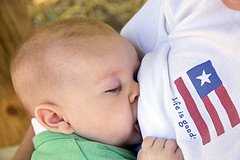Breastfeeding Baby: Safety Guide
It is well known that there are many benefits and advantages for a breastfed baby. Doctors recommend breastfeeding babies for at least 6 months. You can find lots of resources for general information on breastfeeding, so our focus here is on safety.
Breastfeeding and Mom’s Diet
When you’re breastfeeding, you’re still eating for two and what you eat gets passed on to your baby. You need a normal healthy diet while nursing. Some mothers may feel the need to have 400 – 500 extra calories per day however the latest studies show that this is not necessary. Talk with your doctor to make sure you’re getting adequate nutrition for you and your baby.
Here are some guidelines for nutrition:
-
> choosing low-fat or non-fat dairy products
> drinking at least 2 to 3 quarts of fluid each day
> eating plenty of fresh fruits and vegetables
> eating protein-rich foods, such as legumes, poultry, fish, and lean meat
> including healthy whole-grain foods in the diet
Making sure that you get proper nutrition while nursing will keep you and your baby safe, happy and healthy.
-
> eat a variety of foods at regular mealtimes
> supplement meals with nutritious snacks and lots of water
> continue taking prenatal vitamins daily

Breastfeeding and Smoking
Smoking poses many risks for baby. It’s recommended that you stop smoking when pregnant and don’t start again. We know that smoking is one of the most difficult addictions to overcome, so we empathize with you if you are struggling.
For baby, if mother smokes, her baby may be fussy and have vomiting or diarrhea. Moms who smoke also produce less breast milk. Babies who are exposed to secondhand smoke have a higher risk for pneumonia, bronchitis, and SIDS.
Breastfeeding and Alcohol
Alcohol passes easily through breast milk to the nursing child. Having a glass of wine once in awhile is okay, but larger amounts of alcohol can make the baby drowsy. It’s best if you wait until just after nursing, rather than just before, to have an alcoholic drink. Many moms decide to pump a bit before feeding baby to clear any alcohol that may have built up in their milk.

Breastfeeding and Food Allergies
Food allergies are lessened among babies who have been breastfed. Many food allergies are inherited. Breast milk coats the baby's intestines and keeps allergens from getting into the bloodstream. As a result, breastfeeding can reduce the baby's chance of developing an allergy. If the baby does develop a food allergy, the mother will need to stop eating foods that are common triggers for allergies including dairy products, shellfish, wheat, and nuts.
Breastfeeding and Caffeine
Caffeine can also be passed along to baby through breast milk. It’s not a big risk unless you baby is having trouble sleeping. If so, you might want to cut back. We know it’s hard with all those sleepless nights. Cutting back can help you both sleep!
Breastfeeding and Medication
Most medicines have not been tested in nursing women. So no one knows just how safe many medicines may be for the breastfed child.
There are some medicines a nursing mother may take that are known to be harmful for her baby. They include, but are not limited to: bromocriptine, chemotherapy, ergotamine, lithium, and methotrexate. If a woman needs to take these for a short time while nursing, she should pump her breasts and throw out the milk so that she keeps up her supply. Meanwhile, the baby can drink formula or previously frozen breast milk.
Although many medications are safe to use while breastfeeding, most drugs will get into your milk to some degree and may even affect your milk supply. To be safe, check with your child's doctor before taking any kind of medication, even over-the-counter drugs. Another great source of information is the LactMed database online if you have more questions about how a drug you're taking might affect your breast milk or your baby.
Here is the link to the LactMed website:
LactMed Website Link
Breastfeeding and Herbal Remedies
There have not been a lot of studies done on the affect of herbal remedies on baby. They can be passed to the baby through breast milk. A few are known to be safe. You should check with your doctor before using others.
Other Tips for Breastfeeding Women
All moms should start exercising 6 weeks after her baby's birth. It's best to start light and build up a little at a time. It will help you feel better and help your body to adjust to all the changes you’re going through and deal with stress better. It’s possible that lactic acid caused by strenuous exercise may alter the taste of breast milk.
Want to look your best? It's safe for moms color their hair when breastfeeding. We don’t recommend doing the both at the same time! Take a few minutes to relax.
Not feeling well? It’s okay to continue nursing your baby. Your breast milk will pass on antibodies and protect your baby from catching the illness. Check with your doctor to make sure that any medicines and treatments you take for your illness are safe for your baby.
Breastfeeding and Pumping: Saving for Later
· Put expressed breast milk in the refrigerator or freezer. Write the date on the container before you freeze it. You can store breast milk for up to three months in a freezer that has a separate door. If your refrigerator is kept between 32-39°F, you can keep it in the refrigerator for up to 8 days. The bottom line is that you should taste or smell milk before giving it to your baby, just to make sure it is ok.
· Warm bottles of breast milk under running hot water or in a bowl of warm water. Shake the bottle and then test the temperature of the milk on the back of your hand.
Breastfeeding Problems? Get help with latching on, oversupply, nipple pain and more!
www.Breastfeeding-Problems.com
What If I Can't Breastfeed? Formula Feeding / Bottle Feeding High Chair Safety Organic Baby Food Baby Food Preparation and Storage Baby Food Allergies Baby Safety Resources - Home Page





